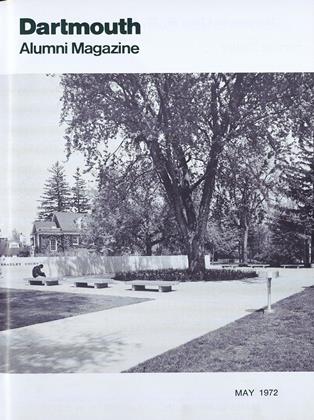By Viktor Shklovsky. Edited and translated from the Russian by Richard Sheldon (Associate Professor of Russian andChairman of the Department of RussianLanguage and Literature). Cornell University Press, 1971. 164 pp. $7.95.
Viktor Shklovsky was a member of that brilliant intellectual and artistic society which flourished in St. Petersburg just before the First World War. It was an exciting, almost feverish, time of creativity. Meyerhold, Shostakovich, Diaghilev, Malevich, Blok: in all the arts, there was a questioning, a search for a new originality, new forms, new methods. At "The Roving Dog," a cabaret and rendez-vous for the artistic world of Petersburg, ideas were exchanged and latest developments discussed. Shklovsky, scarcely out of his student's surcoat, met and moved with poets who gathered there, among them Mayakovsky, Akhmatova, and Mandelshtam.
Shklovsky was later to crystallize some of the ideas current in this society but only vaguely perceived in the years before the War. His critical articles were among the first from the group of scholars and literary theorists called "formalists"; this group included such figures as Roman Jakobson, Boris Tomashevsky, and Boris Eikhenbaum
The War, then revolution and civil war, scattered the once close literary and artistic world. By the early '20s, things were becoming more and more difficult for the intellectuals in Russia, and a great number emigrated. Many, like Shklovsky, went to Berlin, to the Russian enclave near the zoo. Much of the pathos of the novel Zoo derives from the situation of these rootless, passportless Russians trying to piece together a life like that of pre-War Petersburg. Shklovsky noted the disintegration of even this bit of Russian cultural life, and returned to Russia.
Amazingly, through the hard years that followed and the awful purges of the thirties, this returned emigre came to no harm. And it is the more amazing, since he and his wife never hesitated to help those who were in trouble with the police, at a time when the very offer of shelter could bring a denunciation. Shklovsky survived, and continues his critical and literary work today.
Letters Not About Love is an epistolary novel about an epistolary novel, and it is, of course, about love. Shklovsky's love for Elsa Triolet (in later years a noted French author and wife of Louis Aragon) is the constant which welds together the most disparate letters, some of which were actually written by Elsa herself. The letters contain scholarly essays, literary memoirs, reflections on modern man and the machine age and many other things; often the letters expose and discuss the very devices used to write them. It is an experimental novel and, as an experiment, a highly successful and interesting one.
Mr. Sheldon's translation is both careful and graceful. He had handled the difficult problem of choosing from various editions very well. The absolutely indispensable notes are full and complete. One looks forward to his critical study of Shklovsky.
Professor Driver is on the faculty of BrownUniversity. Professor Sheldon's translationwas cited for excellence in recent judgingfor National Book Awards.
 View Full Issue
View Full Issue
More From This Issue
-
 Feature
FeatureA Valedictorian Changes His Mind
May 1972 By ALBERT WILLIAM LEVI '32 -
 Feature
FeatureMorton, Kilmarx Elected Charter Trustees
May 1972 -
 Feature
FeatureCharlie Zimmerman: An Appreciation
May 1972 By GEORGE H. COLTON -
 Feature
FeatureThe Nautical Nyes
May 1972 By MARY ROSS -
 Feature
FeatureAmerican Musicologist
May 1972 -
 Feature
FeatureTrade Unionist
May 1972
Books
-
 Books
BooksFaculty Publications
June 1934 -
 Books
BooksFACULTY PUBLICATIONS
February 1942 -
 Books
BooksAlumni Articles
January 1953 -
 Books
BooksJOHN SLOAN'S LAST SUMMER
October 1952 By Adelbert Ames Jr. -
 Books
BooksTHE DISCOVERY OF THE ANCIENT WORLD
November 1932 By John Barker Stearns -
 Books
BooksNEW JERSEY HISTORICAL PROFILES REVOLUTIONARY TIMES.
April 1974 By JOHN HURD '21

